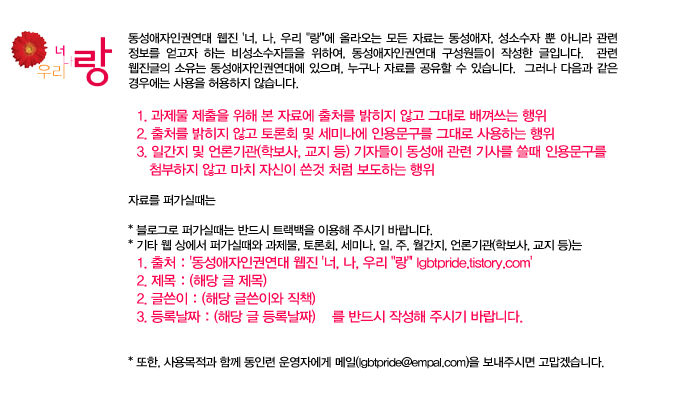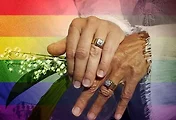마침내, 미군에서 복무하는 동성애자들에 관한 “묻지도 말하지도 마라Don’t Ask Don’t Tell(이하 DADT)” 정책이 버락 오바마 대통령의 강력한 종용으로 의회에서 폐지되었다. 이것은 동성애자들이 자신들의 성 정체성을 감추지 않고서 군복무를 할 수 있다는 것을 의미한다. 진정한 사회 구성원이 되기 위한 오랜 투쟁을 통해 획득한 시민권의 진일보로서 많은 미국 국민들이 이를 축복하고 있다.
아마도 그와 관련한 간략한 역사를 살펴보는 것이 미국 정책에서의 이런 변화가 왜 중요한지에 대한 이해를 도울 것이다. 2차 세계대전 후 미국에서 처음으로 발생한 동성애자인권 운동은 군대에서 명예롭게, 그리고 당당히 복무하기 위한 기회를 얻고자 했던 군인들에 의해서였다. 그러나 한국 전쟁 기간과 그 이후에 미군은 동성애자들을 군대에서 배제시키는 정책을 채택했다. (전에는 오로지 성관계에 연루되었던 사람들에게만 해당되었던 것이다.) 1950년대에는 군대에서 뿐만 아니라 모든 형태의 정부 기관과 심지어 정부를 위해 일하는 회사에서도 동성애자들을 배제시키려는 엄청난 시도가 있었다. 이것은 반공 편집증의 “빨갱이 공포”와 결합되어 있었다. 따라서 군대에서의 동성애 금지는 미국 사회의 동성애자들에 대한 제도적 차별의 시작이었다. 미군이 한국 군대 내 동성애자 군인 금지를 도입한 것도 바로 이 기간 동안이었다. 즉, 미국은 일종의 신식민지 정책으로서 한국 군대에 자신의 동성애혐오를 강요한 것이다.
빌 클린턴은 대통령이 되자 군대 내 동성애자 차별을 완화하려는 노력을 기울였다. 그 결과물이 바로 DADT라는 정책이었다. 이 정책은 누군가를 군복무로부터 제외시키거나 군대에서 누군가를 속출하기 위해서 동성애자인지 아닌지를 찾아내고자 해서는 안 된다는 것을 의미한다. 그러나 이것은 동성애자 군인들이 자신의 성 정체성을 숨겨야만 한다는 것을 의미하는 것이기도 하다. 만약 그들이 커밍아웃을 하거나 “아웃팅”, 즉 누군가에 의해 그들의 성 정체성이 노출된다면, 그들은 즉시 전역해야만 한다. 따라서 이 정책은 실질적으로 아무런 소용이 없는 절충안에 불과하다. 이 정책이 시행되면서 지금껏 수천 명이 전역했다.
DADT 정책 시행이후 17년 간, 많은 것들이 변했다. 사실 여론 조사에 따르면 대부분의 미국인들은 동성애자들이 차별 없이 군복무를 할 수 있어야 한다는 주장에 동의한다. 다수의 군인들 역시 동의하고 있다. 그리고 이제는 군대의 고위층도 동의하고 있으며, 그들 대다수가 이러한 변화를 위해 대통령의 뜻에 따라 강력하게 로비를 했다.
상징적인 측면에서 이러한 변화는 중요하다. 동성애자들에 대한 차별이 한국 전쟁 기간 동안 시작되었던 만큼, 또한 그 제한의 폐지는 다른 형태의 차별을 종결짓는 방향으로 향한다. 이것은 그 자체로 급진적인 움직임은 아니다. NATO의 모든 멤버들은 동성애자들의 군복무를 허용하고 있다. 실제로 미국은 이러한 변화를 이끄는 데 있어 대부분의 민주국가들에 뒤쳐져 있다.
작년 6월에 한국을 방문했을 때, 나는 한국 군대의 정책(군형법92조의 계간조항)을 바꾸려는 활동을 펼쳤던 여러분들과 함께 있었다. 나는 미국에서의 이러한 변화가 미군에 의해 한국에 강요되어왔던 정책을 제거할 수 있도록 한국 사회에 용기를 심어 줄 수 있기를 바란다. 그 차별 정책의 변화는 한국 동성애자들의 존엄성뿐만 아니라 전체 한국 사회와 국민들의 민주적 자율성을 위해서 꼭 필요하다.
한국은 모든 청년들이 반드시 군복무를 해야만 하므로 그러한 변화가 특히 중요하다. 미국에서는 군대의 차별로부터 자유롭고 싶다면, 군 입대를 하지 않으면 그만이다. 그러나 한국에서 군 입대는 선택사항이 아니다. 따라서 전쟁에 반대하는 사람들, 나아가 우리 사회에서 군대의 역할 자체에 반대하는 사람들조차도 군대 내 동성애자 전면 수용을 위한 한국에서의 투쟁은 무척 시급한 사안이다. 역시 군복무가 의무인 이스라엘은 이미 오래 전에 동성애자 군인에 대한 차별을 없앴다. 나는 조만간에 한국에서도 그렇게 되기를 희망한다.
물론 나의 가장 큰 바람은 한국에서, 나아가 모든 나라에서, 군대 그 자체가 무용지물이 되는 평화로운 세상을 만들기 위한 방법을 우리가 찾고자 노력하는 것이다. 특히, 힘겨운 시기를 맞고 있는 남한과 북한 사람들 간의 평화를 위해, 그리고 모든 인류의 평온을 위해 나는 기도한다.
테드 제닝스
Don’t Ask, Don’t Tell
At last the “Don’t Ask Don’t Tell” policy with respect to gay and lesbian people serving in the US military has been repealed by Congress at the strong urging of President Barack Obama. This means that gay and lesbian people will be able to serve in the military without having to hide their sexual orientation. Many are celebrating this as a major advance in civil rights in the long struggle in the US to become a truly inclusive society.
Perhaps a bit of history would be helpful in understanding what is at stake in this change in US policy. After the Second World War the first sustained gay rights movement in the US was that of soldiers who sought the chance to serve openly and with honor in the military. However during and after the war in Korea the US military adopted a policy of excluding gay and lesbian people from the military (before it had only been those who engaged in sexual relations). In the 1950’s there was a massive attempt to exclude gays and lesbians not only from the military but from all forms of government service and even from all businesses that did work for the government. This was connected to the “red scare” of anti-communist paranoia. Thus the ban on gays in the military was the beginning of systematic discrimination against lesbian and gay people in US society. It was precisely during this time that the US military also introduced the ban against gay troops into the Korean military as well. That is, the US imposed its own homophobia onto the Korean military as a part of a sort of neo-colonial policy.
After Bill Clinton became president he sought to relax the discrimination against lesbian and gay people in the military. The result was the “Don’t Ask, Don’t Tell” policy. This meant that the military could not seek to discover whether people were homosexual in order either to exclude them from service or to purge them from the military. However it also meant that lesbian and gay soldiers had to hide their sexual orientation. If they came out, or if someone else “outed” or exposed their orientation, then they would be discharged from the military. This was a compromise that in fact did not work. Thousands have been discharged since the policy was implemented.
In the 17 years since the policy of DADT was implemented many things have changed. In fact according to the polls most Americans agree that lesbian and gay people should be able to serve without discrimination. The majority of soldiers agree. And now the top leadership of the military agrees as well, and in fact most lobbied strongly for this change, following the lead of the president.
The importance of this change is mainly symbolic. Just as the discrimination against lesbian and gay people began with the military during the time of the Korean war, so now the abolition of that restriction points to the end of other forms of discrimination as well. This is not in itself a radical move: all members of NATO allow lesbian and gay people to serve in the military. The US is actually behind most democracies in making this change.
When I was in Korea in June I was with those of you who were lobbying for a change in the policy of the Korean military. I hope the change in the US will encourage the Korean society to eliminate a policy that had been imposed on Korea by the US military. A change in that discriminatory policy is important not only for the dignity of lesbian and gay people in Korea, but also for the democratic autonomy of the Korean society and people generally.
Such a change is even more important in Korea since all young men are required to perform military service. In the US those who wished to escape military discrimination could simply not join the military. In Korea that is not an option. Accordingly, even those of us who oppose war and thus also the role of the military in our societies acknowledge that the struggle in Korea for the full inclusion of lesbian and gay people in the military is an urgently important struggle. Israel, which also has compulsory military service, long ago eliminated discrimination against lesbian and gay soldiers. I hope that one day soon this will also be true in Korea.
Of course my great desire is that for Korea, and indeed for all countries, we will seek and find ways to make a peaceful world in which the military will itself become obsolete. In this time especially, my prayers are for peace among the Korean people, North and South, and peace for all humanity.
Ted Jennings. Chicago Theological Seminary
December 2010
* 글이 마음에 드신다면 아래 view on을 꾹~ 눌러주세요~!
* 웹진 '랑'의 글이 마음에 드신다면 그리고 성소수자 차별없는 세상을 원하신다면 매월 동인련 활동 소식,
회원들의 소소한 이야기들 그리고 성소수자들에게 꼭 필요한 글들을 싣는
동성애자인권연대의 후원을 부탁드립니다.
* 후원은 정기/비정기로 할 수 있으며, 후원 하실 분들은
http://www.lgbtpride.or.kr/lgbtpridexe/?mid=support 를 클릭해주세요^^
* 동성애자인권연대는 정부, 기업의 후원없이 회원들의 회비와 후원인들의 정기, 비정기 후원으로 활동하고 있습니다.
'회원 이야기 > Ted Jennings 칼럼' 카테고리의 다른 글
| 테드제닝스 교수가 말하는 'Marriage Rights, 결혼할 권리' (0) | 2011.08.04 |
|---|---|
| 테드제닝스의 <예수가 사랑한 남자> (1) | 2011.06.27 |
| 동성애자와 기독교인? (2) | 2010.10.19 |
| 테드제닝스가 말하는 <인생은 아름다워> (0) | 2010.09.07 |
| Adam and Steve : 아담과 스티브 (1) | 2010.08.05 |



